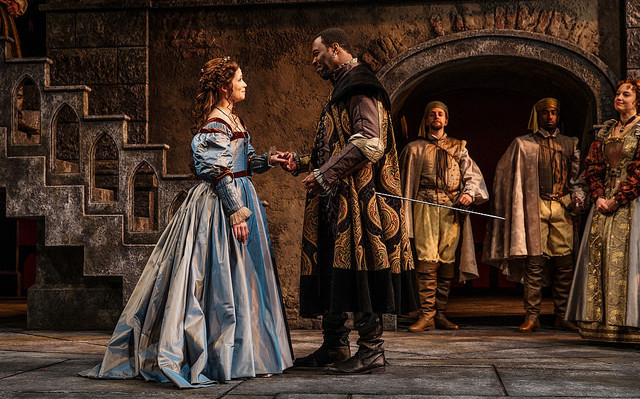Review: PCS’s Othello

Othello's Game of Thrones–worthy set and costumes
Image: Patrick Weishampel
That’s not to say it’s lazy: the dazzling, revolving set by Scott Fyfe; gorgeously realized period costumes from Susan E. Mickey; and appropriately moody lighting design by Peter Maradudin lift up an already strong cast. Shakespeare's story, of a celebrated warrior and the inexplicably evil-hearted standard bearer who drives him to ruin by convincing him of his wife's infidelity, is as tangled and riveting as ever, and PCS's production is simultaneously generous to the material and to its audience. It should leave most viewers transfixed.
Gavin Hoffman bears much of the show’s burden as the scheming, malicious Iago, a role to which the actor brings an unusually light touch. There’s certainly something to be said for playing psychopathology with a touch of subtlety in an era where the off-kilter erraticism of Heath Ledger’s Joker seems a requirement for every crazy Hollywood bad guy. After all, it’s not just inhuman hatred that aids this most peculiar of Shakespearian villains as he systematically dismantles the lives of those around him; it’s a carefully crafted façade of trustworthiness that draws Othello to his “honest Iago.”
Hoffman’s Iago, though, is almost too likeable. The earnest approachability that fools his victims bleeds over slightly to monologues and asides, even though Iago isn’t trying to pull one over on the audience. I’ve seen audiences stunned to silence by the pure malice in other portrayals, but here his audacious mind-games are played for laughs, and it’s a deeply different experience.
Othello
Portland Center Stage
Gerding Theater
Thru May 11
Plenty of actors would deliver the villain’s line during the penultimate scene, “tonight is the night/that either makes me or fordoes me quite,” as a tongue-in-cheek acknowledgement of the disaster guaranteed to befall every character by this point in the story, Iago himself included. Hoffman, though, doesn’t give us anything so easily recognizable as heavy-handed sarcasm. Whether or not you appreciate his approach depends on your willingness to accept Othello as a play with nothing truly solid to grab hold of.
Daver Morrison’s approach to the play’s eponymous character might be similarly unexpected for some. His Othello isn’t quite the imposing physical presence often associated with the role, and there’s even something of a Lear in his increasingly halted delivery as the play’s climax looms near. The Moorish General is an outsider who has fought to prove his worth to an adopted culture, and Morrison’s depiction of his slow unraveling is the most convincing of the cast.
Coleman and his cast and crew have waded admirably, if inoffensively, into what are arguably the Bard’s murkiest waters. In particular, Dana Green’s nearly show-stealing turn in the fifth act as Iago’s wife Emilia comes as a rousing slap in the face to anyone who might disparage Othello for unexamined sexism (I wish I could say something similar about the racial issues, which seem like a missed opportunity). For all the crisp staging and bright performances, though, there’s not much clarity through the murk. It might be frustrating, but it is certainly not forgettable.




